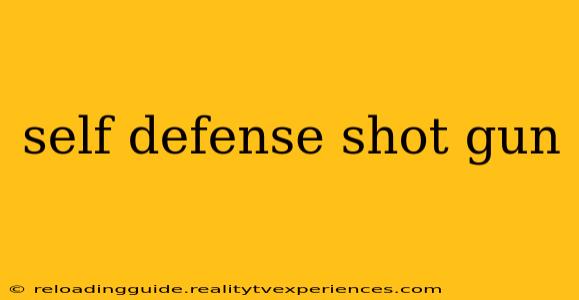Choosing a self-defense shotgun is a serious decision, demanding careful consideration of various factors beyond simply picking the most powerful option. This guide dives deep into selecting the ideal shotgun for home defense, focusing on practicality, safety, and effectiveness. We'll cover crucial aspects to help you make an informed choice that prioritizes your safety and the safety of your family.
Understanding the Advantages of a Shotgun for Home Defense
Shotguns offer several compelling advantages for home defense compared to other firearms:
- Stopping Power: Shotgun shells deliver significantly more energy upon impact than handgun rounds, increasing the likelihood of stopping a threat quickly. The spread of the shot also compensates for less-than-perfect aim in stressful situations.
- Intimidation Factor: The sound of a shotgun being racked is often enough to deter potential intruders. The visual presence of a shotgun is also a powerful deterrent.
- Variety of Ammunition: From buckshot for maximum stopping power to birdshot for less lethal options (though still potentially harmful), shotguns offer versatility in ammunition choices.
- Reliability: Shotguns are generally known for their ruggedness and reliability, functioning even under adverse conditions.
Key Factors to Consider When Choosing a Self-Defense Shotgun
Selecting the right shotgun requires careful consideration of several key aspects:
1. Gauge: Finding the Right Balance
The gauge refers to the diameter of the shotgun barrel. Lower numbers indicate larger bores (e.g., 12 gauge is larger than 20 gauge).
- 12 Gauge: Offers the most stopping power but is also the most powerful, leading to more recoil. This can be a significant factor for smaller individuals or those less experienced with firearms.
- 20 Gauge: Provides a good balance between stopping power and manageable recoil. A popular choice for many home defense users.
- Other Gauges: While other gauges exist (e.g., .410 bore), they're generally less suitable for home defense due to their lower stopping power.
2. Action Type: Pump, Semi-Automatic, or Break-Action?
The action type refers to how the shotgun loads and cycles shells:
- Pump-Action: Reliable, relatively inexpensive, and easy to maintain. The manual pumping action ensures you are aware of each shell being chambered.
- Semi-Automatic: Faster firing rate compared to pump-action shotguns but requires more maintenance and can be more expensive. The automatic cycle could be a disadvantage for someone who is not fully trained.
- Break-Action: Simplest design, ideal for beginners due to its intuitive operation, but slower reloading compared to other action types.
3. Barrel Length: Finding the Sweet Spot
Barrel length influences both maneuverability and effective range. Shorter barrels are easier to handle in confined spaces, while longer barrels offer slightly better accuracy. For home defense, a shorter barrel (18-20 inches) is generally preferred for maneuverability within the home.
4. Stock Type: Comfort and Control
The stock plays a crucial role in how comfortably and effectively you can wield the shotgun. Consider factors like:
- Length of Pull: The distance between the trigger and the butt of the stock. This should be customized for your individual build.
- Stock Material: Synthetic stocks are durable and weather-resistant, while wooden stocks can offer better ergonomics but may require more care.
5. Ammunition Selection: Choosing the Right Shell
The type of ammunition is critical. Buckshot offers the highest stopping power, but birdshot or even less-lethal options are worth considering for situations where minimizing collateral damage is paramount. Always practice with the specific ammunition you intend to use for self-defense.
Safety First: Training and Responsible Ownership
Regardless of the shotgun you choose, proper training is paramount. Take a comprehensive firearms safety course and practice regularly to develop the skills and confidence to handle the weapon safely and effectively. Remember, responsible gun ownership is crucial.
Conclusion: Making the Right Choice for You
Selecting a self-defense shotgun is a personal decision. Carefully consider the factors outlined above, prioritize safety, invest in training, and choose a shotgun that fits your individual needs and abilities. Remember, owning a firearm comes with significant responsibility. Use this information as a starting point for further research and consultation with firearms experts.

